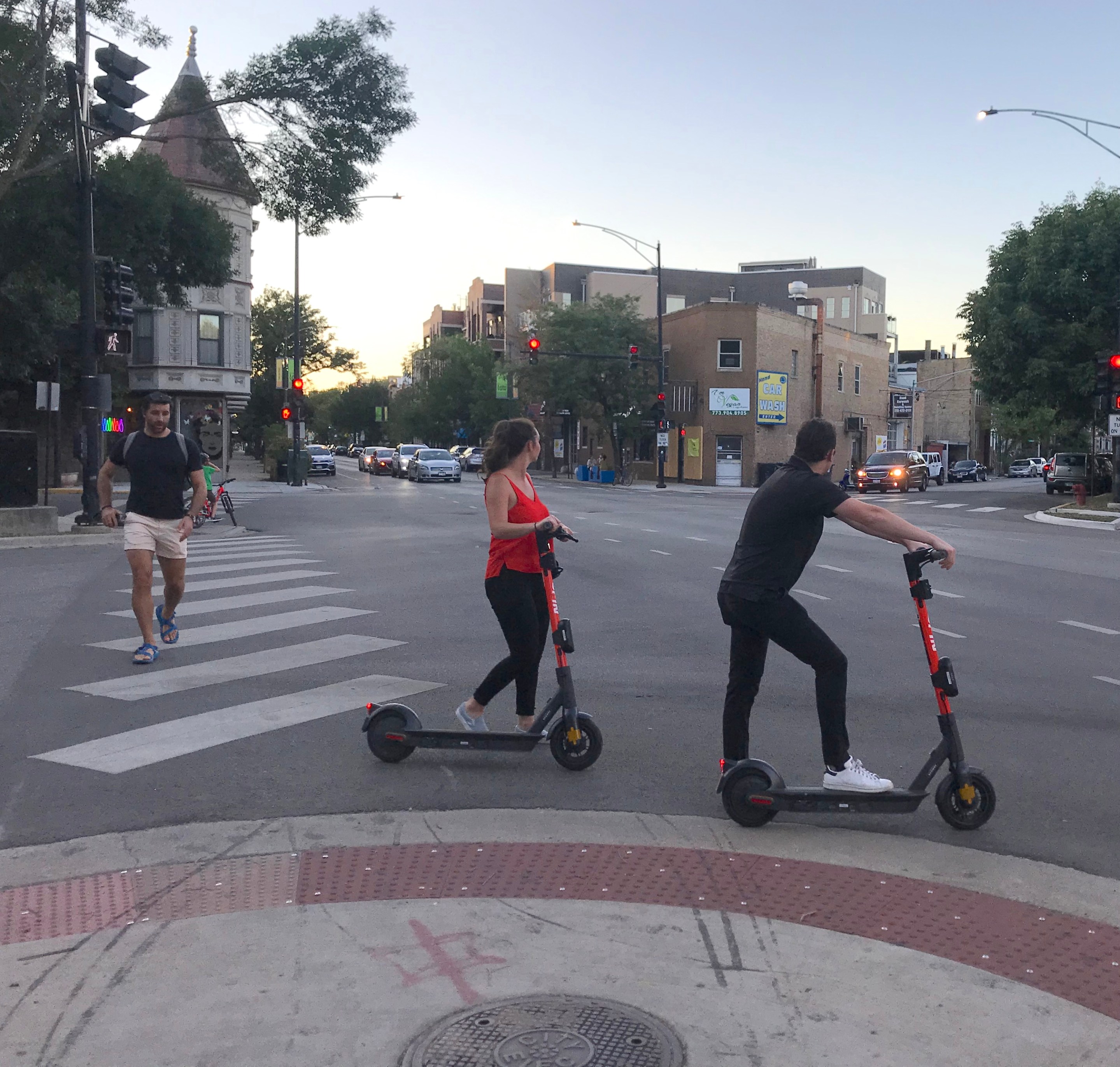Last October, Chicago’s City Council finally approved a permanent, citywide dockless rental electric scooter program, giving residents a new option for fun, space-efficient personal mobility that can help address our city’s congestion, pollution, and traffic violence problems. The authorization followed two scooter pilots in 2019 and 2020.
On Wednesday the Chicago Department of Transportation and the Department of Business Affairs and Consumer Protection launched the application process for a two-year scooter rental license that will let up to three companies to operate in our city. The license is expected to launch this spring, starting with a total of up to 3,000 devices. The companies will be required to deploy sidewalk detection software to discourage sidewalk riding. Scooters will be allowed on all city streets, but the Lakefront Trail, The 606, the Chicago Riverwalk, and the O’Hare Airport area will be off-limits.
“CDOT and our partners at BACP have conducted two pilot projects that tested whether shared electric scooters are a viable addition to the mobility landscape in Chicago," said CDOT Commissioner Gia Biagi in a statement. "We’ve learned that an effectively managed e-scooter program can provide an affordable, convenient and environmentally friendly way for Chicagoans to get around. Working with the City Council, we passed an ordinance to stand up a two-year permit program last year. Shared e-scooters will provide mobility benefits throughout Chicago -- with an emphasis on serving areas that will benefit from new transportation options.”
Applications are due in February. The city says potential concessionaires will be ranked based on criteria that include past performance, operational capacities, technology, and the ability to meet the City’s equity, environmental and safety standards.
This is great....as long as it comes with a plan to provide a CONNECTED PHYSICALLY PROTECTED BIKE/SCOOTER NETWORK! #bikechi @chi_streets @activetrans @streetsblogchi @DivvyBikes https://t.co/oAgdZgy9Ug
— Sarah Eddy (she/her) (@SEddy444) January 12, 2022
The concessionaires will each be licensed to offer up to 1,000 scooters at first, and the companies will be allowed to introduce additional devices if they meet specific ridership, safety, compliance and education requirements. The scooter sharing ordinance allows up to 12,500 total vehicles across all companies.
Requirements of the program include (the city's language):
- Companies must deploy scooters with cable-locking (“lock-to”) technology, requiring them to be locked to fixed objects such as bike racks, street signs or light poles at the end of a trip.
- Companies will be required to deploy technology that detects and reduces sidewalk riding.
- Companies will be required to deploy 50 percent of scooters to Equity Priority Areas covering many south and west side neighborhoods and totaling approximately 50 percent of the entire service area.
- Companies will be required to provide affordable access to shared scooters for low-income residents as well as non-credit-card-based access and non-smartphone-based access.
- Scooters will be allowed to operate between 5 a.m. and midnight and in bike lanes, paths or streets.
- Scooters will be allowed downtown in limited numbers in an effort to balance mobility benefits with parking space constraints.
- Companies will be required to educate scooter users on proper and safe use of the devices and to implement policies that encourage compliance with safety rules, including learn-to-ride classes and in-app education.
- Companies will face fines if they fail to remove improperly parked scooters within two hours of a complaint.
- At least 5 percent of each company’s devices must be accessible for riders with mobility limitations and must feature a seat at minimum.
- Companies must provide free or discounted helmets.
- The ordinance includes new consumer protection policies, including data privacy rules, prohibiting companies from charging fees while riders are completing education, and prohibiting companies from requiring riders to pay in advance for more than one ride.
In addition to three scooter share vendors, the ordinance also allows CDOT to incorporate electric scooters the City’s Divvy bikeshare system. A source told Streetsblog that if Divvy expands to scooters, they would likely be available for use by current bike-share members.
LeAaron Foley, Lime’s director of government relations, provided the following statement regarding the application process. "Lime is thrilled about the opportunity to bring safe, sustainable, and affordable e-scooters back to Chicago this spring and we thank the city for making this happen. We plan to submit a proposal that provides transit solutions for Chicago residents, particularly in parts of the city that lack access to affordable and equitable ways to get around. We can't wait to help get Chicago moving again.”




